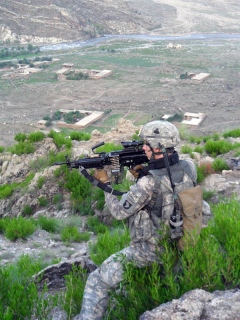'I still don't know how I didn't get hit'
Before the Chinook even touched down in the rugged mountain terrain of eastern Afghanistan, Pfc. Richard Bennett and his comrades were under heavy fire.
As the rounds rained down from the mountains, soldiers raced for the exit. There was little time. The landing zone was hot and the chopper needed to make a quick escape.
“Being the last guy off, the bird was about five feet off the ground when I got to the back door and I had to jump out,” said Bennett, a soldier with the 1st Battalion, 327th Infantry Regiment from the 101st Airborne Division.
It was Aug. 30, 2010, in the Korengal Valley, one of the most dangerous places in Afghanistan. During the air assault mission, which inserted the men into an insurgent-laden mountainside village, the initial fire directed at the Chinook marked the beginning of a long and violent day. Over a 17-hour stretch, Bennett and his fellow soldiers engaged in a near-constant firefight with an elusive enemy, who used their knowledge of the tough terrain to their advantage.
Bennett knew he was in for a rough day. As the troops trekked through a cornfield of 9-foot-high stalks, insurgents took aim from within the dense vegetation, using the corn as cover. It was a tactic that surprised the troops, who were expecting fire to continue from the mountainside, Bennett said. The troops took extra caution to avoid shooting one of their own as they returned fire.
“It’s a big responsibility for a man of my low rank, but desperate times call for desperate measures.”
- Pfc. Richard Bennett, writing in his journal
Bennett eventually got into a clearing and was able to take aim.
“I was returning fire to those bastards from behind a tree when all of a sudden I hear a voice yelling, “Doc’s hit, Doc’s hit,” said Bennett, now a corporal.
That’s when Bennett turned and saw Spc. Matthew Shreeve some 40 yards in the distance.
“He was exposed. He’s face down and taking fire,” said Bennett. “I bolted out to him and jumped on top of him. He was shot in the neck, so I’m laying on top of him trying to cover him and cover his neck.
“I still don’t know how I didn’t get hit.”
As he lay on top of Shreeve, Bennett called for Pvt. Randy Knoblaugh to provide assistance.
“I’m screaming at him to come out and help, so he comes out and gets shot in the hand,” Bennett said. “I told him to go back.”
Bennett then lugged the injured medic to cover inside a vacant house 20 yards away.
Once inside, Bennett assessed the neck wound and discovered that the exit wound was in the middle of Shreeve’s back. Remarkably, no vital organs were hit, Bennett said.
“The medevac landed pretty far away, so we had to move both of these soldiers,” Bennett said. “We got them through some pretty rocky terrain. We’re taking contact the whole time.”
For thrusting himself into the line of fire to save the life of a fellow soldier, Bennett received the Silver Star, the third-highest medal for combat valor.
Months after the battle, then-Defense Secretary Robert Gates pinned Bennett with the medal.
At the time, Bennett had been in the Army for just more than a year and yet he found himself in an unexpected position of leadership within his platoon.
A few weeks before the air assault mission, his team leader was injured during a patrol. Days later, his squad leader also was severely injured by a roadside bomb.
The unit called on Bennett, then a private first class and now a corporal, to serve as a squad leader in charge of 10 men.
“I had been in the Army maybe 15 months maximum. Here I am a squad leader and we’re going into the Korengal Valley,” he said. “I was definitely nervous and overwhelmed.”
Bennett pondered in his personal journal what it meant to lead other young troops in battle, especially one as risky as the air assault.
“It’s a big responsibility for a man of my low rank, but desperate times call for desperate measures,” Bennett wrote. “This mission would end up testing my leadership capabilities at the highest levels. This mission definitely handed me more than I ever thought, but I’d like to think I did what I could for my Soldiers. That’s what it’s really all about for the boots on the ground anyway.”
Today, Bennett is busy training a new group of soldiers for deployment to Afghanistan. However, he won’t be with them when the mission starts later this year.
Bennett said he plans to leave active duty in the coming months and return to college. Though it’s been two years, Bennett still returns in his mind to that dangerous day in the Korengal Valley.
“I don’t know how I’m alive, how Doc is alive,” Bennett said. “I hate to give the old cliched answer about how you listen to your training, but that’s what happened. This guy is shot and he needs help. He’s face down and alone. Your training takes over at that point. You just have to go to work.”













